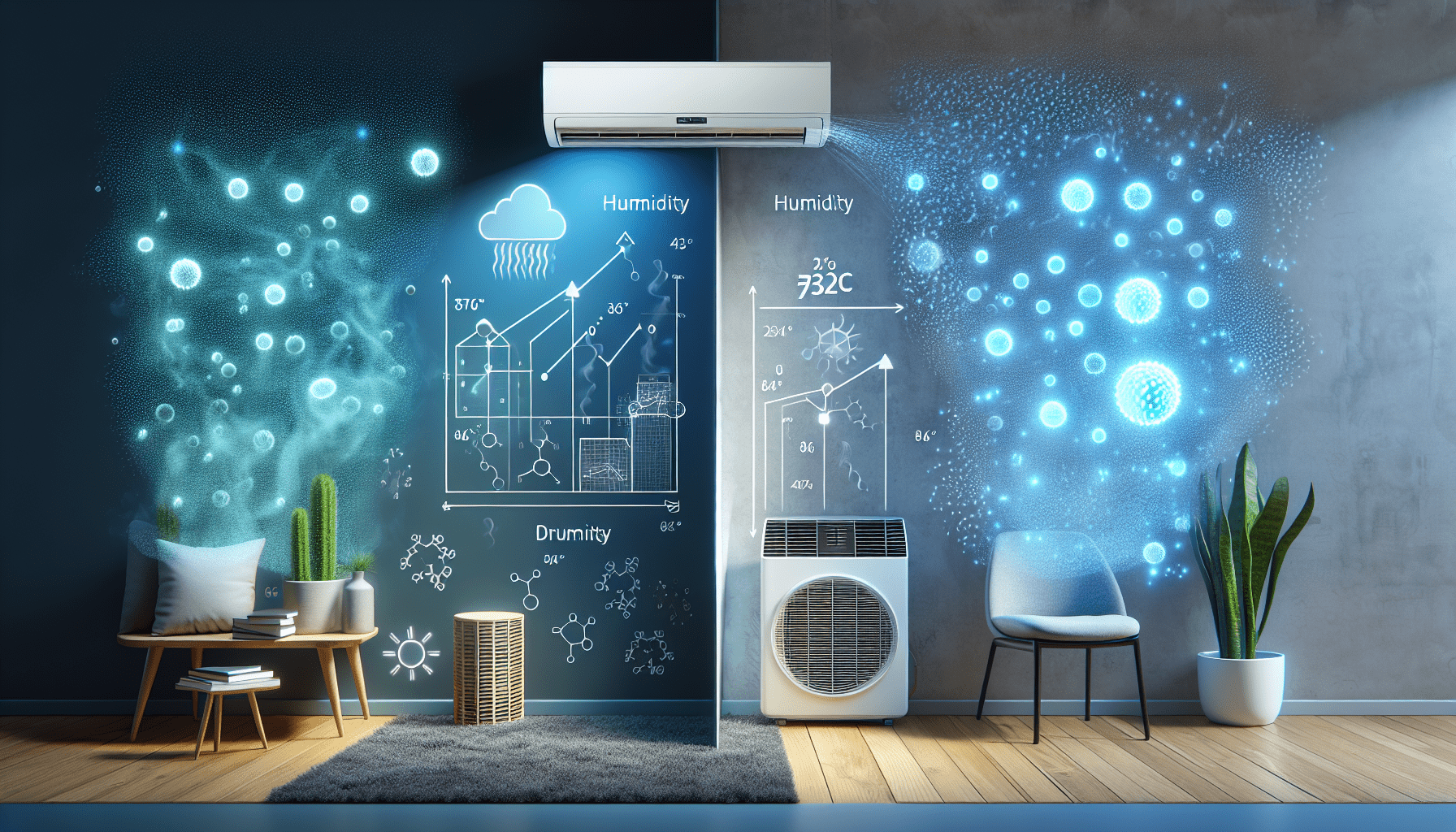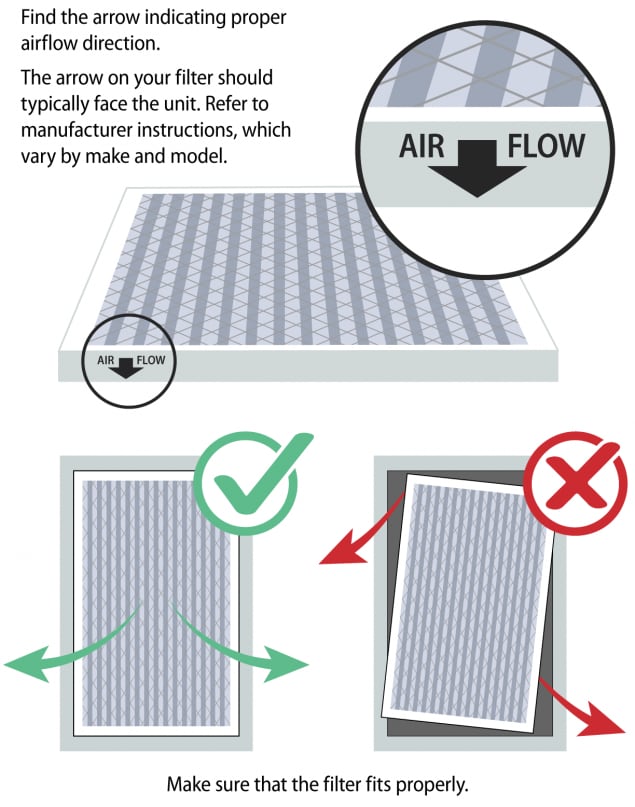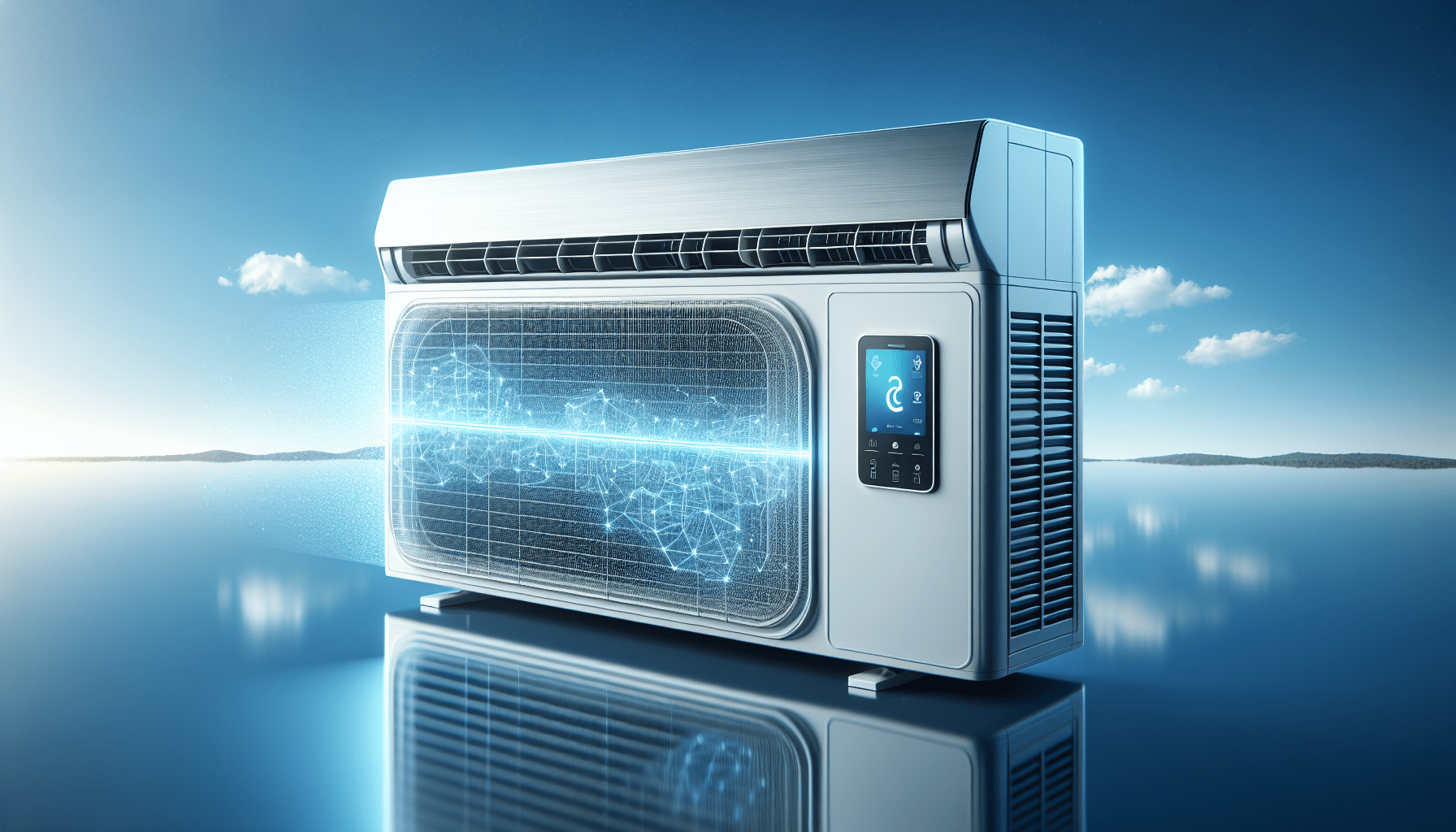Maintaining your air conditioning filters is crucial for ensuring the efficiency and longevity of your cooling system. Not only does regular cleaning help improve the air quality in your home, but it also prevents dust and debris from clogging the filters and reducing their effectiveness. In this article, you will discover simple and effective methods to properly clean and maintain your air conditioning filters, allowing you to enjoy cool and clean air all year round.
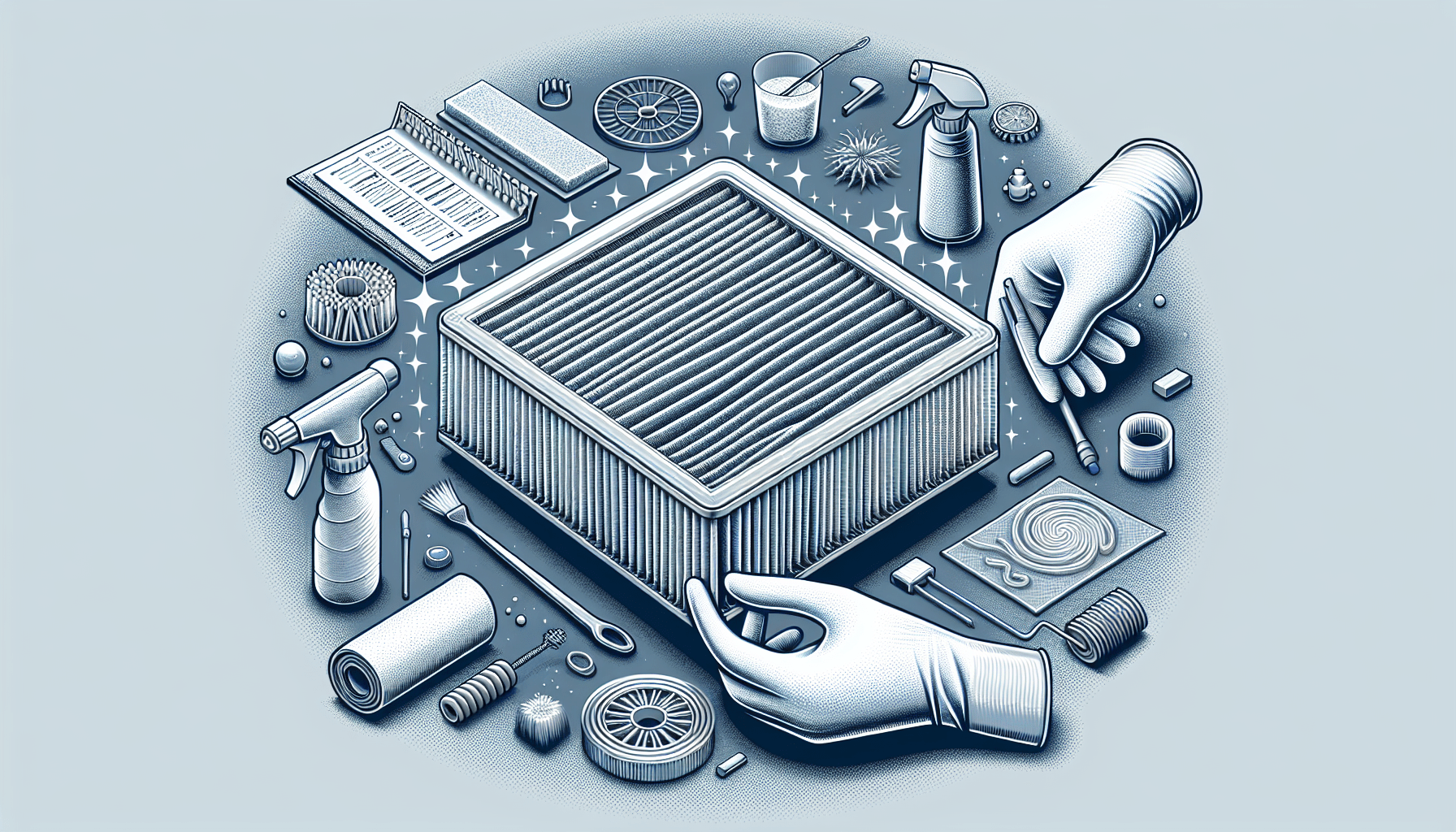
Understanding How Air Conditioning Filters Work
The purpose of AC filters
Air conditioning filters play a crucial role in maintaining the efficiency and longevity of your HVAC system. Their main purpose is to trap dust, pollutants, allergens, and other particles from the surrounding air. As the air passes through the filter, it captures these contaminants, preventing them from entering your home and affecting the indoor air quality.
Common types of air conditioning filters
There are several types of air conditioning filters available in the market. The most common ones include fiberglass filters, pleated filters, electrostatic filters, and HEPA (High-Efficiency Particulate Air) filters. Fiberglass filters are the most basic type and are generally used to protect the HVAC system from large debris. Pleated filters are more efficient at capturing smaller particles, while electrostatic filters use static electricity to attract and trap contaminants. HEPA filters provide the highest level of filtration and are especially beneficial for people with allergies or respiratory conditions.
How often filter maintenance is required
The frequency of filter maintenance depends on various factors, including the type of filter, the surrounding environment, and the usage of your HVAC system. In general, it is recommended to clean or replace your air conditioning filter every 1-3 months. However, it is crucial to inspect the filter regularly and clean or replace it more frequently if it appears dirty or clogged. Regular maintenance not only ensures optimal performance but also helps in extending the lifespan of your air conditioner.
The Importance of Regularly Cleaning Your AC Filter
Improvement of HVAC efficiency
Regularly cleaning your AC filter is essential for improving the efficiency of your HVAC system. When a filter becomes clogged with dirt and debris, it restricts the airflow and forces the system to work harder to maintain the desired temperature. This increased workload can lead to higher energy consumption and reduced cooling efficiency. By cleaning or replacing the filter regularly, you can ensure that your air conditioner operates at its optimal level, resulting in better energy efficiency and cost savings.
Extension of air conditioner longevity
Cleaning your AC filter regularly can significantly extend the lifespan of your air conditioning unit. When the filter is dirty, it not only hampers the airflow but also allows dust and debris to accumulate on the evaporator coil, fan, and other internal components. This buildup can lead to overheating, increased wear and tear, and even system malfunctions. By keeping the filter clean, you can prevent unnecessary strain on the components, reducing the risk of breakdowns and prolonging the lifespan of your air conditioner.
Enhancement of indoor air quality
Maintaining good indoor air quality is crucial for the health and comfort of your household. Dirty filters can harbor various contaminants, such as dust mites, pollen, pet dander, and mold spores. When these particles circulate in the air, they can trigger allergies, worsen respiratory conditions, and cause general discomfort. Regularly cleaning or replacing your AC filter helps to remove these harmful pollutants from the air, creating a cleaner and healthier living environment for you and your family.
Prevention of cooling system breakdowns
Neglecting regular AC filter maintenance can lead to serious cooling system breakdowns. A clogged filter restricts airflow, causing the evaporator coil to freeze and the condenser to overheat. These issues can result in compressor failure, refrigerant leaks, and other costly repairs. By keeping your filter clean, you can prevent these malfunctions and ensure that your cooling system functions smoothly.
How to Determine if Your Filter Needs Cleaning
Visual inspection for dirt and clogs
One of the simplest ways to determine if your AC filter needs cleaning is through a visual inspection. Remove the air filter from your unit and examine it for signs of dirt, dust, or clogs. If you notice a significant amount of debris accumulated on the filter, it is a clear indication that it needs cleaning or replacement. Additionally, check for any damages or tears in the filter material that may impair its functionality.
Checking if AC unit is not cooling efficiently
If you have noticed that your air conditioner is not cooling your home as effectively as before, a dirty filter could be the culprit. A clogged filter restricts the airflow, making it harder for your AC unit to cool the air. If you have ruled out other potential causes of reduced cooling efficiency, such as refrigerant leaks or faulty components, it is advisable to check and clean your filter.
Noting an unusual rise in electricity bills
A sudden increase in your electricity bills can also be an indication that your AC filter needs cleaning. When the filter is clogged, your HVAC system has to work harder to maintain the desired temperature, resulting in higher energy consumption. If you have not made any significant changes in your energy usage and notice a significant spike in your bills, it is worth checking and cleaning your filter.
Observing an increase in allergy symptoms in the household
If you or your family members have been experiencing an increase in allergy symptoms, such as sneezing, coughing, or itchy eyes, it could be a sign that your AC filter needs cleaning. A dirty filter allows allergens and pollutants to circulate in the air, triggering allergic reactions. By cleaning or replacing the filter, you can reduce the presence of these irritants and alleviate allergy symptoms.
Gathering Needed Cleaning Supplies
Raw materials and utilities needed
Before you begin cleaning your AC filter, gather the necessary cleaning supplies. You will need a vacuum cleaner with a brush attachment or a soft brush, a mild detergent or vinegar, a clean cloth or sponge, and access to clean water. Additionally, have a garbage bag or trash bin nearby to dispose of any debris or dirt removed from the filter.
Safety equipment to use
While cleaning your AC filter, it is important to prioritize safety. Wear a pair of gloves to protect your hands from any dirt, debris, or cleaning agents. If you have allergies or respiratory sensitivities, consider wearing a mask to minimize your exposure to potential allergens.
Preparing your workspace
Before you start cleaning your AC filter, make sure to prepare your workspace adequately. Lay down a drop cloth or old towel to catch any dirt or water that may drip from the filter during the cleaning process. Position yourself in a well-ventilated area to avoid inhaling dust or cleaning agents. It is also ideal to work in an area that is easy to access and has proper lighting.
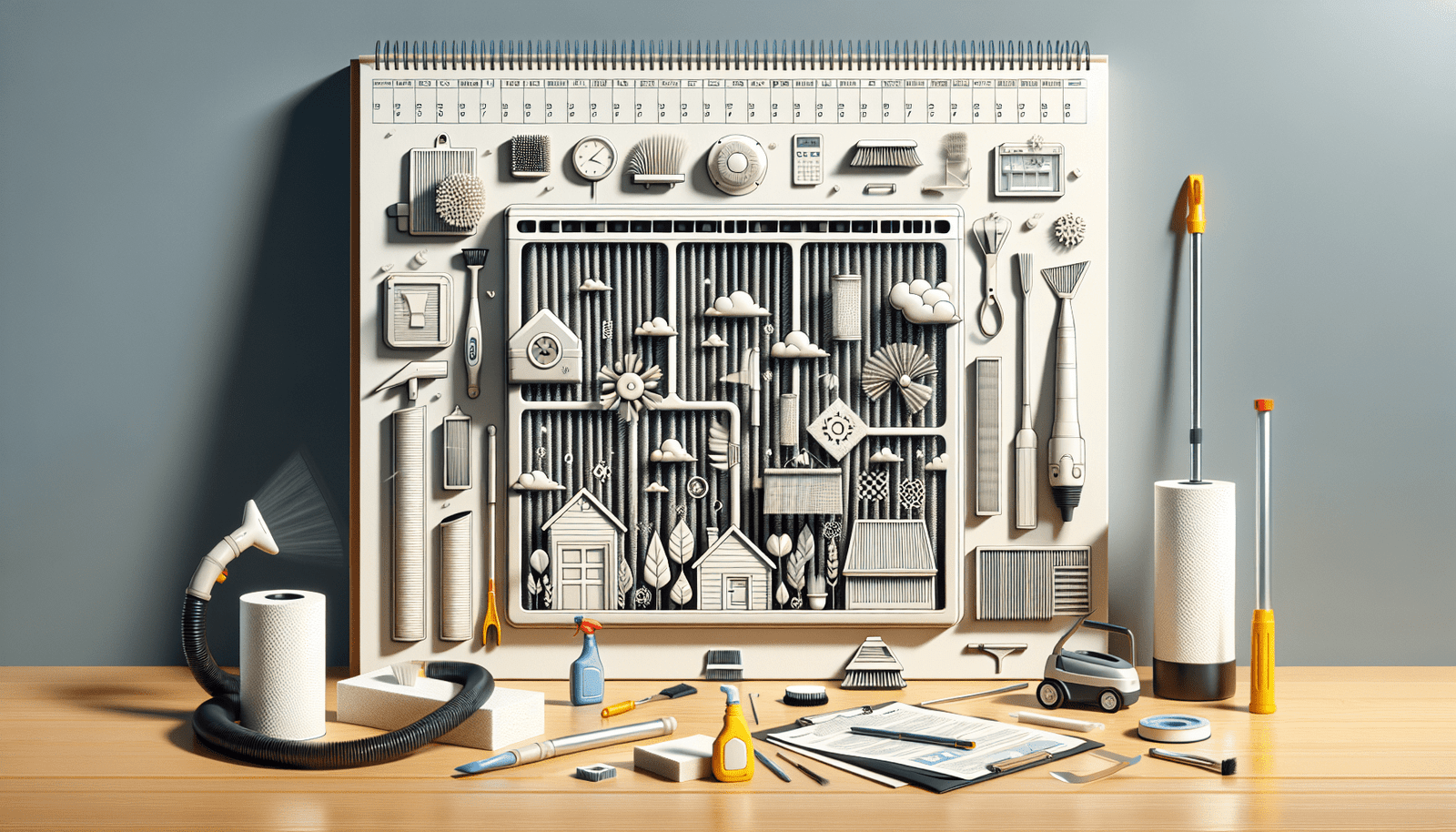
Step by Step Guide to Cleaning Your AC Filter
Switching off and unplugging the air conditioner
Before removing the filter, switch off your air conditioner and unplug it from the power source. This ensures your safety and prevents any electrical mishaps. Allow the AC unit to cool down before proceeding with the cleaning process.
Removing the filter from the unit
Locate the filter compartment in your air conditioning unit. Depending on the model, the filter compartment may be on the side, front, or back of the unit. Open the compartment and carefully remove the filter. Take note of the orientation and position of the filter, as it needs to be reinstalled correctly after cleaning.
Gently cleaning the filter
Start by using a vacuum cleaner with a brush attachment or a soft brush to remove loose debris and dust from the filter. Lightly brush the surface of the filter, ensuring that you cover all areas. Be gentle to avoid damaging the filter material. If your filter is not excessively dirty, this step may be sufficient to restore its functionality.
Rinsing and drying the filter
If your filter is significantly dirty or if brushing alone does not remove all the debris, rinsing is necessary. Fill a basin or sink with warm water and add a mild detergent or a mixture of water and vinegar. Submerge the filter in the water and gently agitate it to loosen the dirt. Allow the filter to soak for a few minutes. Afterward, rinse the filter under clean running water to remove any remaining detergent or vinegar.
Once you have rinsed the filter, gently squeeze out excess water without wringing or twisting it. Take care not to damage the filter material during this process. Place the filter on a clean cloth or towel and allow it to air dry completely. It is important to ensure that the filter is completely dry before reinstalling it to avoid mold or mildew growth.
Reinstalling the filter
Once your filter is dry, carefully reinsert it into the filter compartment, following the same orientation and positioning as before. Ensure that the filter fits snugly and securely in place. Close the filter compartment and make sure it is properly sealed.
Common Mistakes to Avoid When Cleaning Your AC Filter
Using harsh cleaning agents
Avoid using harsh cleaning agents or chemicals, as they can damage the filter material and compromise its functionality. Stick to mild detergents or natural cleaning solutions like vinegar, which effectively remove dirt and debris without causing harm.
Rushing the drying process
Properly drying the filter is crucial to prevent mold or mildew growth. Avoid rushing the drying process by using heat sources or direct sunlight, as this may shrink or warp the filter material. Allow the filter to air dry naturally and thoroughly before reinstalling it.
Not cleaning the filter housing
While cleaning the AC filter itself is important, it is equally essential to clean the filter housing. Accumulated dirt and debris in the housing can affect the filter’s performance and the overall efficiency of your air conditioner. Use a soft cloth or vacuum cleaner to remove any dirt or dust from the filter compartment before reinstalling the filter.
Reinstalling the filter while it is still wet
Never reinstall a filter that is still wet or damp. Moisture trapped in the filter can lead to mold or mildew growth, which not only affects the air quality but also damages the filter material. Ensure that the filter is completely dry before putting it back into the unit.
When to Replace Your AC Filter
Lifespan of various types of AC filters
The lifespan of an air conditioning filter depends on its type and quality. Fiberglass filters typically last up to 30 days, while pleated filters can have a lifespan of 90 days or longer. Electrostatic and HEPA filters tend to have longer lifespans, ranging from 6 months to 1 year or more. It is important to refer to the manufacturer’s recommendations and replace the filter accordingly.
Signs of wear and tear
Even with regular cleaning, AC filters eventually wear out and lose their effectiveness. Signs of wear and tear include visible damage to the filter material, such as holes, tears, or excessive dust buildup. If you notice any of these signs, it is advisable to replace the filter, as a damaged or worn-out filter cannot effectively capture contaminants.
In case of persistent inefficiency even after cleaning
If you have cleaned your filter thoroughly and noticed no improvement in the cooling efficiency of your air conditioner, it may be time to replace the filter. In some cases, filters can become so clogged or damaged that cleaning is no longer effective. Installing a new filter can help restore the optimal performance of your HVAC system.
How to Properly Install a New AC Filter
Choosing the right filter for your AC unit
When it comes to selecting a new AC filter, it is essential to choose the right type and size for your specific air conditioning unit. Refer to your owner’s manual or consult with a professional to determine the appropriate filter requirements. Consider factors such as filter efficiency, allergen capture rate, and durability when making your choice.
The correct insertion of the filter
To properly install a new AC filter, begin by opening the filter compartment of your air conditioner. Take note of the directionality indicators on the filter, such as arrows or labels indicating the airflow direction. Insert the filter into the compartment, ensuring that the airflow matches the direction specified by the manufacturer. Be careful not to force the filter, as this can cause damage or poor sealing.
Knowing when to change the filter
Once you have installed a new AC filter, it is important to keep track of its lifespan and know when to replace it. Mark the installation date on a calendar or set a reminder on your phone to help you remember when it is time for a replacement. Following the manufacturer’s recommendations or consulting with a professional can also ensure that you change the filter at the appropriate intervals.
Maintaining Your AC Filter Between Cleanings
Regular visual check-ups
In addition to regular cleaning or replacement, it is beneficial to perform visual check-ups on your AC filter. Take a quick look at the filter every month to observe its condition. If you notice any excessive dirt or debris accumulation, consider cleaning or replacing the filter sooner than scheduled.
Scheduling routine cleanings
To maintain your AC filter’s efficiency, it is important to establish a routine cleaning schedule. Set reminders or mark a specific day each month to check, clean, or replace the filter. By following a consistent cleaning routine, you can ensure that your filter remains in good condition and your HVAC system operates optimally.
Avoiding situations that can dirty the filter faster
To prolong the cleanliness of your AC filter, it is advisable to avoid situations that can contribute to faster dirt accumulation. Minimize activities that generate excessive dust, such as sanding or remodeling projects, near the air conditioning unit. Keep doors and windows closed as much as possible to prevent outdoor pollutants from entering the indoor space. Regularly vacuum and dust your home to reduce the amount of debris that can reach the filter.
Professional Help for AC Filters
When to seek help from professionals
While regular maintenance can be performed by homeowners, there are situations where professional help may be required. If you are unsure about how to clean or replace your AC filter, it is always best to consult with a professional HVAC technician. They can provide guidance, expertise, and ensure that the cleaning is done correctly. Additionally, if you notice any issues with your HVAC system that go beyond filter-related problems, it is advisable to seek professional assistance.
Choosing the right HVAC service provider
When selecting an HVAC service provider, it is important to choose a reputable and experienced company. Look for certifications, licenses, and customer reviews to gauge their expertise and professionalism. Consider getting multiple quotes and compare the services offered before making a decision. It is also helpful to inquire about warranties, maintenance plans, and after-service support.
Cost considerations for professional cleaning and maintenance
The cost of professional cleaning and maintenance for AC filters can vary depending on your location, the size of your HVAC system, and the specific services provided. While professional help may incur an additional cost, it can be a worthwhile investment to ensure the optimal performance and longevity of your HVAC system. Consider the long-term benefits and potential energy savings when evaluating the cost-effectiveness of professional services.
By understanding how air conditioning filters work and the importance of regularly cleaning and maintaining them, you can ensure the efficiency, longevity, and indoor air quality of your HVAC system. Develop a cleaning routine, follow proper cleaning techniques, and seek professional help when needed to maximize the benefits of your air conditioning filter maintenance. With a little effort and care, you can enjoy a comfortable and healthy living environment all year round.


